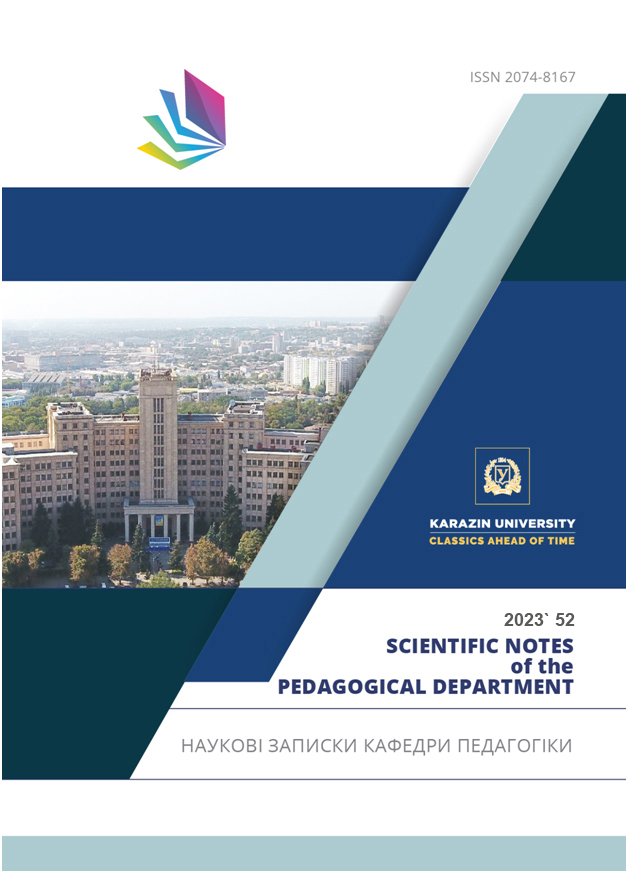Means of forming another language communicative competence of students of non-lingual specializations
Abstract
Problem formulation. In pedagogy, enough experience has been accumulated to solve scientific and practical tasks related to the problem of forming the foundations of a student`s professional orientation. In the scientific literature, professional orientation is considered as a leading personality trait, which includes the entire system of motivations for life and activity, that determines the selectivity of relationships, positions and activity in professional activity. The problem of professionality oriented communication is considered in the works of many scientists and practitioners. In turn, the problem of learning a foreign language based on the principles of professionally oriented communication is closely related to issues of motivation. The communication-oriented approach today is a methodological standard, and the creativity of students is one of its characteristic features of the communicative-oriented approach today is a methodological standard, and the creativity of students is one of its characteristic features of the communicative-oriented approach. The creative element of the communicative approach allows to organize the usage of a foreign language in productive activities, including communication, the sphere of service business, management, jurisprudence, art, self-education. The purpose of the article is to determine and characterize the means of formation of foreign language communicative competence of students with non-languge specialities.
Downloads
References
Bilianska, I. P. (2018). Formation of English language additive competence of future teachers using audio books of works of art: dissertation. ... candidate ped. Sciences: 13.00.02 / Volodymyr Hnatyuk Ternopil. national ped. University. Ternopil. 316 s. [in Ukrainan].
Biretska, L. S. (2015). Formation of English lexical competence of future doctors in professionally oriented reading: author’s abstract. thesis ... candidate ped. Sciences: 13.00.02 / Kyiv. national language Univ. Kyiv. 22 s. [in Ukrainan].
Voronina, K. V. & Valiiova, T. B. (2020). Formation of business communication skills in students of non-language
majors by means of a foreign language. VIRTUS. 84. [in Ukrainan].
Horpinich, T. I. (2014). Methodology of formation of professional English language competence in reading among future pharmacists taking into account individual cognitive learning styles: thesis. ... candidate ped. Sciences: 13.00.02 / Ternopil. Volodymyr Hnatyuk National University. Ternopil, 300 s. [in Ukrainan].
Zharko, O. (2018). Formation of communicative competence in students of non-language majors when studying a foreign language in institutions of higher education of the I-II levels of accreditation. A young scientist. 10 (62). 54-59. [in Ukrainan].
Kyrykylytsia, V. V. (2015). Formation of foreign language knowledge and skills of students of non-language majors in the process of working with dictionaries. Scientific notes of Ternopil National Pedagogical University named after Volodymyr Hnatyuk. Series: pedagogy. 1. 88-94. [in Ukrainan].
Kovalchuk, I. S., Haidai, I. O. & Khorosh, O. V. (2020). Pedagogical principles of formation of foreign language communicative competence of students of non-language majors. The 2nd International scientific and practical conference “The world of science and innovation”(September 16-18, 2020) Cognum Publishing House, London, United Kingdom. 381. [in Ukrainan].
Krysak, L. V. (2016). Methods of training future general practitioners in English-language professionally oriented dialogic speech: diss. ... candidate ped. Sciences: 13.00.02 / Kyiv. Taras Shevchenko National University. Kyiv. 285 s. [in Ukrainan].
Kukharonok, S. S. (2019). Interactive technologies as a means of forming foreign language communicative competence of students of non-language majors. Problems and prospects of updating foreign language communicative training of specialists in the 21st century: a collection of materials of the 6th All-Ukrainian scientific and practical webinar with international participation (November 27, 2019). [in Ukrainan].
Lazarenko, L. M. & Barabash, I. V. (2017). The use of interactive teaching methods in the formation of foreign language communicative competence in students of non-language majors. Scientific Bulletin of the International Humanitarian University. Series: Philology. 31 (2). 154-157. [in Ukrainan].
Matiienko, O. & Buchatska, S. (2022). Formation of foreign language communicative competence in students of non-language majors by means of role-playing games. Modern information technologies and innovative teaching methods in the training of specialists: methodology, theory, experience, problems. 154-166. [in Ukrainan].
Salashchenko, H. M. (2019). Peculiarities of the formation of foreign language communicative competence of students and cadets of non-language institutions of higher education by means of project technologies. Legal journal of Donbass. 3. 153–160. [in Ukrainan].
Svyrydenko, I. M. (2015). Peculiarities of the formation of foreign language communicative competence in students of non-language majors. Scientific notes of the National University Ostroh Academy. Series: Philological. 58. 309-311. [in Ukrainan].
Chorna, I. Yu. (2017). Formation of future marketers’ English-language lexical competence in writing by means of case technology: dissertation. ... candidate ped. Sciences: 13.00.02 / Ternopil. national pedagogue of the University named after Volodymyr Hnatyuk, Ternopil. 268 s. [in Ukrainan].
Ianenko, L. P. & Yurchuk, L. V. (2014). Possibilities of developmental learning for students’ foreign language
competence. Language and culture. 17, T. 5. 88–92. [in Ukrainan].
Bender, B.M. (2017). Pretences in Language Teaching. English Language Teaching.19. 20. [in English].
Long, Michael H. & Patricia A. Porter. (2016). Group work, interlanguage talk, and second language acquisition. TESOL Quarterly, 19, 2, 207-208.
Morska, L., Horpinich, T. & Olendr, T. (2018). Teaching medical students professional English reading on the
basis of individual cognitive learning styles. Science and Education. 2. 86–93.
Niederhauser, J.S. (2017). Motivating Learners at South Korean Universities. FORUM. 35, 1. 39. [in English].
Rusalkina, L. G. (2018). Integration of professional and linguistic disciplines of foreign-language orientation in the educational process of higher medical schools. European Journal of Humanities and Social Sciences. 6. 93–96.

